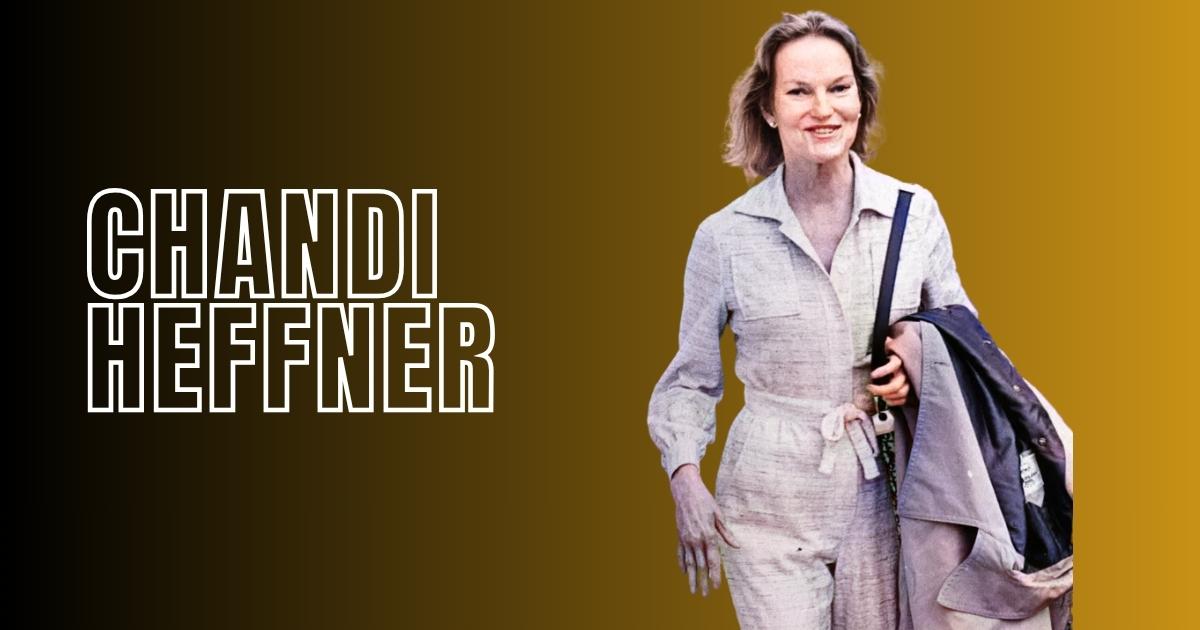The story of Chandi Heffner, the adopted daughter of tobacco heiress Doris Duke, reads like a Hollywood script. Wealth beyond imagination collided with spiritual seeking. A bond formed that seemed unbreakable, yet shattered spectacularly. The Doris Duke estate became the center of one of America’s most controversial inheritance battles. Today, people still wonder: what really happened between these two women?
This isn’t just another tale about money. It’s about identity, belonging, and what happens when material abundance meets spiritual emptiness. Chandi Heffner’s biography reveals layers most people never see.
Who Is Theodora Holmes? Inside the Life of Troy Polamalu’s Wife
Quick Bio
Charlene Gail “Chandi” Heffner transformed from a middle-class Baltimore girl into the center of a billion-dollar controversy. Her spiritual journey led her to a name change and eventually to one of America’s wealthiest women.
| Detail | Information |
| Birth Name | Charlene Gail Heffner |
| Spiritual Name | Chandi Heffner (adopted in her 30s) |
| Born | 1952, Baltimore, Maryland |
| Adoptive Mother | Doris Duke (tobacco heiress) |
| Adoption Year | 1988 |
| Known For | Inheritance dispute, spiritual awakening, philanthropic work |
| Settlement | Approximately $65 million |
| Current Status | Residing in Hawaii, private life |
The Chandi Heffner story captivates because it challenges our assumptions. Can you buy family? Does wealth guarantee happiness? Her life answers these questions in unexpected ways.
Early Life and Background
Chandi Heffner’s early life began in Baltimore, far from the opulence she’d later know. Born Charlene Gail Heffner in 1952, she grew up in a modest Catholic household. Her childhood background was typical American middle-class nothing suggested the extraordinary turn her life would take.
She received a Catholic education that emphasized discipline and faith. These formative years planted seeds of spiritual curiosity. The structured religious environment both comforted and confined her. Questions about meaning and purpose emerged early.
Her family history revealed no connections to wealth or privilege. Just ordinary people living ordinary lives. Yet something within Charlene yearned for something more not material riches, but deeper understanding. This restlessness would define her path.
The contrast between her Baltimore upbringing and her later life in Duke’s mansions couldn’t be starker. From modest row houses to oceanfront estates. From budgeting carefully to unlimited resources. But money, as she’d learn, solves some problems while creating others entirely.
How Old Is Chandi Heffner and What Does She Look Like?
Chandi Heffner is now in her early 70s, born in 1952. Time has passed since the dramatic Duke-Heffner relationship captivated media attention. Age has brought wisdom and perhaps peace after tumultuous years.
Descriptions of her appearance emphasize a natural, understated beauty. She never embraced the heavily made-up socialite look. Her spiritual awakening influenced her presentation simple clothing, minimal jewelry, an authentic presence that stood apart from Duke’s glittering social circle.
Photographs from different decades show evolution. The young woman who met Duke radiated earthy spirituality. Her style reflected her Hare Krishna movement connections flowing fabrics, natural colors, an Eastern-influenced aesthetic. This visual difference attracted Duke, who sought alternatives to her conventional world.
Today, Chandi Heffner’s personal life remains intensely private. Recent photos are rare. She’s chosen retreat over spotlight, privacy over publicity. Her appearance now reflects a woman who’s lived through extraordinary circumstances and emerged seeking only peace.
Spiritual Journey and Name Change
The transformation from Charlene to Chandi marked a profound shift. Her spiritual journey began in her twenties when Eastern philosophy called to her. The name change meaning went deep “Chandi” represents a powerful goddess in Hindu tradition, embodying strength and protection.
Her involvement with the Hare Krishna movement wasn’t superficial. She studied Sanskrit, practiced meditation daily, and embraced vegetarianism. This commitment to Indian spirituality provided structure and meaning her earlier Catholic upbringing hadn’t satisfied. Faith and peace became her primary pursuits, not worldly success.
This spiritual awakening occurred during America’s fascination with Eastern religions. The 1970s and 80s saw many seekers turning eastward. But Chandi’s dedication went beyond trendy exploration. She lived her beliefs authentically, even when it meant standing apart.
Her spiritual practices included:
- Daily meditation sessions lasting several hours
- Devotional chanting and kirtan participation
- Yoga practice focusing on spiritual rather than physical benefits
- Vegetarian lifestyle aligned with ahimsa principles
- Study of sacred texts including Bhagavad Gita
This spiritual foundation would later attract Doris Duke. The heiress, jaded by conventional society, found Chandi’s authenticity refreshing. Their bond initially formed around shared spiritual interests before evolving into something resembling family.
Meeting Doris Duke and Adoption
The meeting that changed everything happened in Hawaii during the mid-1980s. Doris Duke, then in her 70s, encountered Chandi through mutual friends in spiritual circles. The tobacco heiress had long explored alternative philosophies, collecting Islamic art and studying various traditions. Chandi’s knowledge impressed her immediately.
What began as spiritual mentorship evolved rapidly. Duke, childless despite marriages and relationships, saw in Chandi the daughter she’d never had. The younger woman’s helping others philosophy resonated with Duke’s own charitable donations history, though their approaches differed dramatically.
The adult adoption in 1988 shocked high society. Duke was 75; Chandi was 35. Unusual adoption cases involving wealthy benefactors and younger adults always raise eyebrows. Critics whispered about manipulation and gold-digging. Supporters saw genuine connection between two lonely souls.
The legal adoption story moved quickly once Duke decided. As an adopted by billionaire daughter, Chandi suddenly accessed unimaginable wealth. Duke gifted her:
- $1 million annual allowance
- Access to multiple mansions including Shangri La in Hawaii
- Designer wardrobes and jewelry collections
- Travel on private jets to global destinations
- Introduction to elite social circles previously inaccessible
The Duke-Heffner relationship seemed genuinely affectionate initially. They shared interests in animals, particularly camels and dogs. Both women felt like outsiders despite or because of their circumstances. Duke’s legacy giving philosophy initially included Chandi as a primary heir to the Duke fortune.
Life as Doris Duke’s Daughter
Living as the Doris Duke daughter meant inhabiting a gilded cage. The privileges were extraordinary, yes, but expectations and scrutiny came attached. Chandi experienced both the intoxication and isolation of extreme wealth.
Daily life involved moving between Duke’s properties:
- Shangri La in Honolulu Duke’s passion project filled with Islamic art
- Rough Point in Newport the opulent ocean-side mansion
- Duke Farms in New Jersey 2,700 acres of preserved land
- Falcon’s Lair in Beverly Hills Rudolf Valentino’s former estate
The Duke inheritance seemed secure. Chandi accompanied Duke everywhere, managing her increasingly complex needs. The heiress’s health fluctuated, and her temperament could shift dramatically. Friends noted Duke’s controlling nature intensified with age.
But cracks appeared in their relationship. Duke’s associates resented Chandi’s influence. Jealousy and suspicion festered among longtime employees and advisors. Some genuinely worried about Duke’s wellbeing; others feared losing their own access and influence.
The bond that once seemed unbreakable began fraying. Duke’s mood swings became more pronounced. Arguments erupted over minor issues. The woman who’d embraced Chandi as family started pulling away, influenced by whispers of manipulation from her inner circle.
Who Is Doris Duke?
Understanding Doris Duke wealth and philanthropy provides essential context for the Chandi story. Born November 22, 1912, Doris inherited approximately $100 million at age 12 when her father, tobacco magnate James Buchanan Duke, died. That fortune, equivalent to billions today, defined and complicated her entire existence.
The tobacco heiress lived a life of spectacular privilege shadowed by profound loneliness. Multiple marriages failed. No biological children came, despite her desires. She filled the void with passion projects Duke foundation causes, art collecting, and environmental preservation. Her charitable donations ran into hundreds of millions.
Duke’s personality combined generosity with suspicious control. She could be warm and welcoming, then cold and dismissive. Staff members described her as both kindhearted and impossible. This complexity made relationships with her perpetually unstable.
Her interests ranged widely:
- Islamic art and culture (Shangri La showcased this passion)
- Environmental conservation (Duke Farms became a model)
- Historic preservation (Newport Restoration Foundation saved colonial buildings)
- Jazz music (she supported musicians financially)
- Animal welfare (she maintained exotic animal collections)
The Duke legacy includes both cultural contributions and family dysfunction. Her philanthropy history shows someone who understood wealth’s responsibility. Yet her personal relationships consistently failed, suggesting money couldn’t buy the connection she craved.
When she met Chandi, Duke hoped this spiritual seeker might offer what others couldn’t genuine companionship without ulterior motives. Tragically, that hope would collapse into bitter Duke family feud dynamics.
Legal Battles Over the Estate
The Doris Duke legal battles erupted after Duke disinherited Chandi in 1991, just three years after the adoption. The abrupt reversal shocked everyone. Duke’s new will named her butler, Bernard Lafferty, as executor and left Chandi nothing from the Duke fortune.
Duke died October 28, 1993, at age 80. Her estate, valued at approximately $1.2 billion, became contested territory. The inheritance lawsuit Chandi filed claimed undue influence by Lafferty and others who’d poisoned Duke against her.
The court dispute revealed disturbing details:
- Duke had become increasingly isolated and possibly chemically dependent
- Lafferty, an alcoholic with questionable credentials, controlled access to Duke
- Duke’s mental state during the will changes raised serious questions
- Multiple parties stood to benefit from Chandi’s exclusion
The public trial through media coverage (the case settled before full trial) exposed the dysfunction surrounding extreme wealth. The estate settlement eventually awarded Chandi approximately $65 million in 1995 a fraction of what she would have inherited as the adopted daughter.
Key elements of the Doris Duke estate battle included:
| Issue | Details |
| Original Will | Chandi named as primary heir |
| Changed Will | Chandi completely disinherited |
| Timing | Changed just before Duke’s death |
| Influencers | Bernard Lafferty and other staff members |
| Mental Capacity | Questions about Duke’s competence |
| Settlement | $65 million to Chandi to avoid trial |
The inheritance dispute revealed how wealth attracts predators and complicates even genuine relationships. Did Chandi manipulate Duke, as some claimed? Or was she the victim of a conspiracy by those who resented her influence? Truth likely lies somewhere between these extremes.
Personal Life and Relationships
Chandi Heffner’s personal life has remained remarkably private considering her public controversies. Before meeting Duke, she’d married briefly, but the marriage ended in divorce. Her divorced status when she entered Duke’s orbit may have contributed to their bond two women without conventional family structures.
One notable connection involved comedian Paul Reubens (known as Pee-wee Herman). The two reportedly dated and maintained friendship over years. This Paul Reubens connection showed Chandi’s ability to relate to creative, unconventional individuals. Reubens, himself no stranger to controversy, understood the burden of public scrutiny.
Her relationships generally avoided the spotlight. Unlike Duke, who married multiple times seeking completion, Chandi seemed content with solitude punctuated by meaningful friendships. Her spiritual practice emphasized inner development over external validation through romantic partnerships.
After the settlement, her private lifestyle became even more guarded. She’d experienced the dark side of publicity the accusations, the invasive questions, the judgment from strangers. Retreat into privacy wasn’t weakness but wisdom.
Those who know her describe a complex woman:
- Deeply spiritual yet pragmatic about money
- Generous with time and resources
- Protective of personal boundaries
- Intelligent and well-read across multiple subjects
- Compassionate particularly toward animals
Her Hawaii life provides the peace she sought. The islands offer both beauty and distance from the mainland’s intensity. There, she’s not “Doris Duke’s adopted daughter” but simply Chandi, living according to her values.
Philanthropic Work
Chandi Heffner philanthropy has focused primarily on animal welfare and Hawaiian community support. Unlike her adoptive mother’s high-profile Duke foundation approach, Chandi’s charitable work tends toward hands-on involvement and local impact.
Her Hawaii ranch serves multiple purposes personal residence, animal sanctuary, and community resource. The animal rescue operations there reflect her longtime commitment to creature welfare. She’s taken in everything from abandoned dogs to farm animals needing homes.
The Waimea foundation work (though details remain private) apparently supports:
- Local Hawaiian families through educational scholarships
- Animal care programs providing veterinary services
- Environmental protection initiatives on the islands
- Cultural preservation of traditional Hawaiian practices
Her approach to helping others differs markedly from typical wealthy philanthropist patterns. Rather than building named institutions or seeking recognition, she practices what spiritual traditions call “dana” generosity without attachment to results or credit.
Chandi Heffner’s wealth enables this quieter form of giving. The settlement, while controversial, provides resources for meaningful impact. Some estimate her Chandi Heffner fortune has grown through wise investment, though exact figures remain private. The Heffner assets fund her charitable work while maintaining her independence.
This nonprofit foundation approach honors both her spiritual values and perhaps Duke’s better impulses. Where Duke’s legacy giving sometimes seemed performative, Chandi’s feels more organic an expression of values rather than reputation management.
Critics might argue she should give more given her wealth. But those close to her work suggest her hands-on involvement and strategic giving creates impact beyond simple dollar amounts. She’s apparently learned that Chandi Heffner money spent wisely matters more than money spent visibly.
Current Life and Legacy
Chandi Heffner today lives quietly in Hawaii, far from the controversy that once consumed her life. At 72, she’s found the peace her younger self sought through spiritual practice. Her Hawaiian residence provides beauty, privacy, and purpose through animal care and community involvement.
Is Chandi Heffner still alive? Yes, absolutely. The question arises because she’s maintained such privacy that some assume she’s passed away. Her tropical life continues, focused on the values that originally drew Duke to her compassion, spirituality, and authenticity.
The Chandi Heffner Duke identity that hyphenated name linking her to the tobacco fortune no longer defines her completely. She’s reclaimed herself as simply Chandi, or perhaps even Charlene to some. The biographical details of her past inform but don’t imprison her present.
Charlene Gail Heffner today represents something important about resilience and reinvention. She survived:
- The intoxication of sudden wealth without losing her spiritual center entirely
- Public vilification during the estate battles
- The loss of a complicated mother figure in Duke
- Years of legal stress and uncertainty
- Media invasion of her most painful moments
Her Doris Duke daughter status, once everything, now forms just one chapter in a longer story. The life story continues evolving as she ages, hopefully with the grace and wisdom her spiritual practices cultivate.
The question “Is Chandi Heffner still alive” also reflects public fascination with wealth’s aftermath. We want to know: did the money bring happiness? Did the battles leave scars? Has she found peace? The answers seem to be: somewhat, certainly, and mostly yes.
Her legacy will likely emphasize:
- The complexity of adult adoption especially involving wealth
- The risks and rewards of unconventional families
- The importance of spiritual grounding amid material chaos
- Quiet philanthropy over public recognition
- The value of privacy after public scrutiny
Chandi Heffner Net Worth
The Chandi Heffner net worth question fascinates because it represents both victory and loss. The 1995 settlement awarded her approximately $65 million an enormous sum, yet a fraction of what she would have inherited as Duke’s daughter.
Estimates of her current wealth vary significantly. Conservative figures suggest the original settlement, wisely invested over nearly three decades, has grown substantially. Chandi Heffner’s wealth likely exceeds $100 million today, though exact figures remain private. Her Chandi Heffner fortune supports her lifestyle and philanthropic interests without requiring any return to public life or additional wealth accumulation.
Breaking down Heffner assets (based on public records and estimates):
| Asset Category | Estimated Value |
| Real Estate (Hawaii properties) | $15-25 million |
| Investment Portfolio | $60-80 million |
| Cash and Liquid Assets | $10-20 million |
| Business Interests | $5-10 million |
| Total Estimated Net Worth | $100-150 million |
The Doris Duke settlement she received has been managed conservatively, apparently. Unlike some inheritance recipients who spend recklessly, Chandi’s spiritual values may have provided protection against materialism’s worst impulses. Chandi Heffner money funds meaning, not mere consumption.
Context matters when evaluating her wealth. The Duke fortune she might have fully inherited was worth over $1 billion. She received roughly 5-6% of that amount. Fair? Perhaps not. Sufficient for a comfortable life? Absolutely.
Her Chandi Heffner assets fund several priorities:
- Comfortable but not ostentatious housing in Hawaii
- Animal welfare programs requiring significant funding
- Community charitable initiatives supporting local needs
- Personal living expenses at a quality level
- Security and privacy measures protecting her wellbeing
The wealth provides freedom freedom from work she doesn’t want, freedom to support causes she values, freedom from the financial anxiety most people experience. But it also came at enormous emotional cost through the betrayal, legal battles, and public scrutiny.
Would she trade it all to have maintained the relationship with Duke? Only Chandi knows. But her choices suggest she values peace and purpose over maximizing wealth, and privacy over any public vindication the full inheritance might have provided.
Conclusion
The Chandi Heffner story illuminates uncomfortable truths about wealth, family, and belonging in America. Here was a woman seeking spiritual meaning who found herself entangled in a billion-dollar drama. The adopted daughter of one of America’s richest women, Chandi experienced both the seduction and destruction money can bring.
Her journey from Baltimore upbringing through spiritual awakening to life as the Doris Duke daughter defies simple categorization. Was she victim or opportunist? Probably both and neither just a human being navigating extraordinary circumstances with the wisdom and flaws we all possess.
The estate battle resolved legally but not emotionally. Questions linger: Did Duke truly turn against Chandi, or was she manipulated by others? Was their bond genuine or transactional? Could any relationship survive the pressures that destroyed theirs?
Today, Chandi Heffner today apparently lives according to values established before Duke entered her life. Her philanthropic work suggests the spiritual seeking that originally defined her remains central. The Hawaii ranch and animal rescue activities reflect compassion over consumption.
Her biographical details remind us that even extraordinary stories feature ordinary human needs for love, acceptance, and purpose. The Doris Duke adoption didn’t fulfill those needs ultimately, though it provided resources and experiences beyond imagination.









